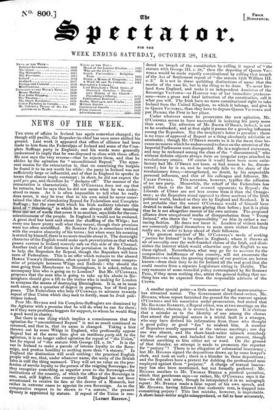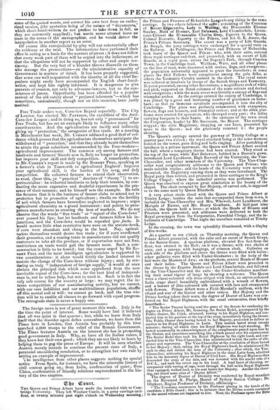A smaller special point—a little matter of legal manceuvering- has
attracted notice. The Government short-hand-writer, Mr. HUGHES, whose report furnished the ground for the warrant against O'CONNELL and his associates under prosecution, had stated that Mr. RICHARD BARRETT, a Repeal editor, was at two meetings on the 9th October, whereas, it is averred, he was absent. It is obvious that a mistake as to the identity of one among the chorus that attend the principal actors is a trivial fault in a stranger, who may have derived his information from those who thought it good policy or good " fun " to mislead him. A number of Repealers usually appeared at the various meetings ; one day one was absent, and the short-hand-writer mistook somebody for the absent man, and included the latter as present, though without ascribing to him either act or word. On the ground of that blunder, an attempt is made to prosecute the reporter for " perjury "! There is no allegation of substantial inaccuracy ; but Mr. HUGHES signed the depositions drawn up by some lawyer's clerk, and took an oath ; there is a blunder in those depositions ; and the Repealers have a pretext for dubbing the professional man employed against them " perjurer." A charge of textual inaccu- racy has also been mentioned, but not formally preferred : Mr. HUGHES ascribes to Mr. Tnosias STEELE a poetical quotation, which that gentleman says—or rather, Mr. O'CONNELL says it for him—he did not utter, though he interpolated it in an autograph report : Mr. STEELE made a false report of his own speech, and Mr. HUGHES, having followed that authentic text, is trapped into committing perjury I This last mistake, however, is improbable. A short-hand-writer might misapprehend, or fail to hear accurately,
some of the quoted words, and correct his own text from an autho- rized version, (the quotation being of the nature of "documents; which short-hand-writers do not profess to take down in full, an they are commonly supplied); bu►t words never uttered leave no trace in the notes of the stenographist, and be would. detect the interpolation in another report as an error. Of course this extrajudicial by-play will not substantially affect the evidence at the trial. The informations have performed their office in acting as a basis for the warrant of arrest ; it does not follow that every weak part of them will be copied into the indictment, or that the allegations will not be supported by other and ample tes- timony. But the very fact of a blunder throws discredit on those who manage the prosecutions—on the administrative capacity of Government in matters of detail. It has been properly suggested, that some one well acquainted with the identity of all the chief Re- peelers might easily have accompanied the English short-hand- writer, and kept him rightly informed. It is dangerous to give pretexts of evasion, not only to advocate-lawyers, but to the con- sciences of jurors. Opportunity has been afforded for a popular revival of the old outcry about " perjured informers "—which has sometimes, undoubtedly, though not on this occasion, been justly merited.



























